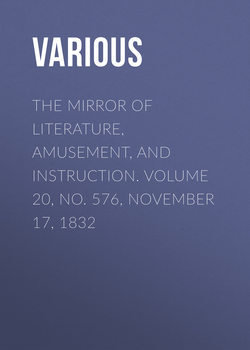The Mirror of Literature, Amusement, and Instruction. Volume 20, No. 576, November 17, 1832

Реклама. ООО «ЛитРес», ИНН: 7719571260.
Отрывок из книги
This interesting structure is referred to by a clever writer1 as one of the richest specimens extant of the highly-ornamented embattled mansions of the time of Henry VII. and VIII., the period of transition from the castle to the palace, and undoubtedly the best aera of English architecture. This judgment will be found confirmed in the writings of distinguished antiquarians; and the reader's attention to the descriptive details of this building will be important in connexion with several notices, in our recent pages, of old English domestic architecture.
The manor of Wingfield, or Winfield, is situated four or five miles to the eastward of the centre of Derbyshire. The early lords had two parks, which, according to a survey made in 1655, contained nearly 1,100 acres. These parks are now divided into farms: on the border of one of them are a moat and other remains of an ancient mansion, traditionally said to have been called Bakewell Hall; by some, this is supposed to have been the original mansion, which is said by others to have been near the Peacock Inn, on the road between Derby and Chesterfield. The present Manor-House, (as represented in the Engraving,) according to Camden, was built about the year 1440, by Ralph, Lord Cromwell, in the time of Henry VI. This Lord Cromwell was treasurer of England; and the testimony of Camden that he was the founder, is strongly corroborated by the bags or purses of stones, (alluding to the office of treasurer which he filled,) carved over the gateway leading into the quadrangle. Bags or purses are mentioned to have been carved on the manor-house of Coly Weston, in Northamptonshire, augmented by this Lord Cromwell; and there were also similar ornaments carved in wood, removed about a century ago from Wingfield Manor.
.....
From France the institution gradually spread over the other countries of Europe. In Germany, which country was one of the first to adopt the system of the French Posts were established through the influence and at the expense of Count Taxis, who was denominated "the Patriot." The wishes of the people caught the heart of the Emperor Matthias, who to reward Taxis for his public spirit, gave him the office of Post-master, and assigned it to his descendants for ever.
In England Posts appear to have been established as early as the reign of Edward III.; but the records of them handed down to us are obscure and uncertain. In the reign of Edward VI. they were however in full vigour: an Act of Parliament passed in 1548, which we have now before us, fixes the rate of postage at one penny per mile. The Posts here referred to were only used on important occasions. James I. erected a Post Office, which he placed under the control of Matthew de Questor; the office was claimed by Lord Stanhope, whose claim, however, was disallowed; but owing to the detection of de Questor in some mal-practices, the office was given and confirmed to W. Frizee and Thos. Witherings. In the year 1635, Charles I. erected a letter-office for England and Scotland, which he placed under the direction of the before-mentioned Thomas Witherings, who conducted it honourably, but was afterwards superseded for supposed abuses—a charge which was never proved. The rate paid about that time was "twopence for a letter, from 30 to 140 miles." The Posts then established were shortly after extended to the principal roads of England, and were from time to time increased, till they were spread over the kingdom, to the great benefit of a commercial people.
.....